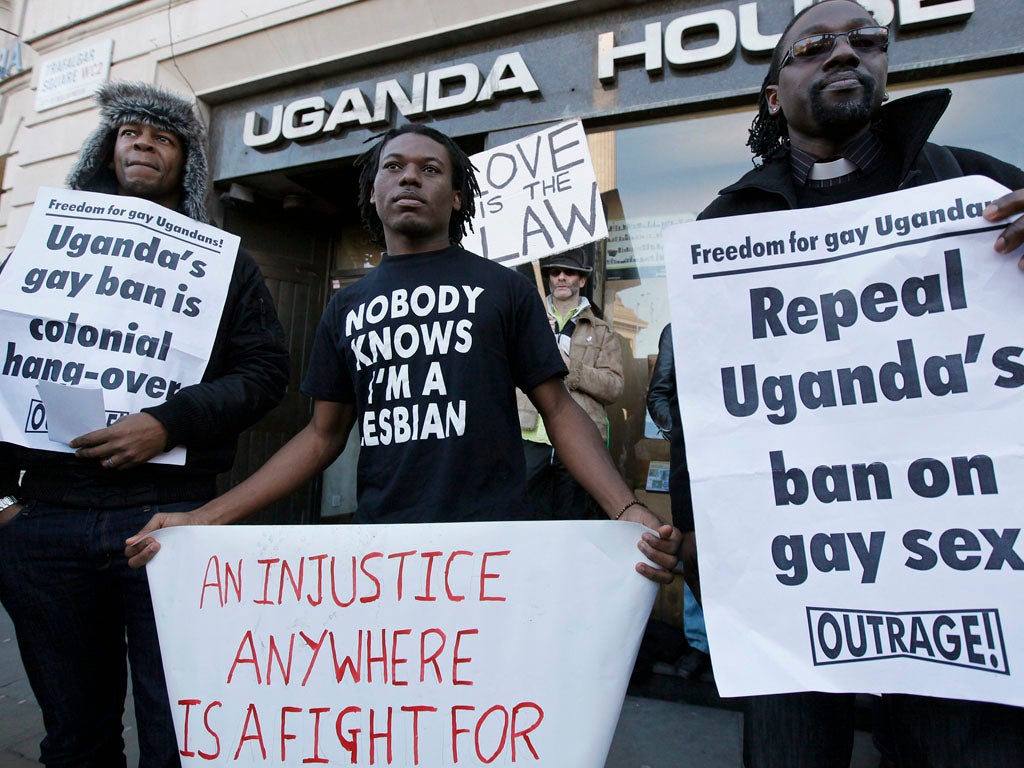LGBT Ugandans are facing a crisis - what action will the UK take?
A day after President Museveni signed the anti-gay bill, a Ugandan newspaper published a list of the ‘200 top homos’. People are living in fear.

Your support helps us to tell the story
From reproductive rights to climate change to Big Tech, The Independent is on the ground when the story is developing. Whether it's investigating the financials of Elon Musk's pro-Trump PAC or producing our latest documentary, 'The A Word', which shines a light on the American women fighting for reproductive rights, we know how important it is to parse out the facts from the messaging.
At such a critical moment in US history, we need reporters on the ground. Your donation allows us to keep sending journalists to speak to both sides of the story.
The Independent is trusted by Americans across the entire political spectrum. And unlike many other quality news outlets, we choose not to lock Americans out of our reporting and analysis with paywalls. We believe quality journalism should be available to everyone, paid for by those who can afford it.
Your support makes all the difference.The sun may have been shining yesterday as Yoweri Museveni signed the Anti Homosexuality Bill, but it was a dark day.
The legislation, first introduced in 2009, threatens lesbian, gay, bisexual and transgender Ugandans with life imprisonment for having sex, getting married or even touching another person with ‘intent’. It also criminalises anyone who ‘aids or abets homosexuality’, potentially including staff from our Ugandan implementing partners who provide HIV prevention and testing for men who have sex with men, one of the groups most affected by the HIV epidemic. In Uganda, where HIV prevalence is 7.2 per cent, this clamp down could be disastrous for public health.
But the Anti Homosexuality Act is not only a crisis for LGBT people or the HIV response. It encroaches on fundamental human rights to privacy, family life, equality and freedom of expression and association, and has been enacted in a context of broader repression, including attacks on the press, opposition leaders, peaceful protest and civil society groups working on corruption and other development issues. It also legitimises violence against people who are known or thought to be gay. Already today a Ugandan newspaper has run a cover story exposing the country’s ‘200 top homos’. Will Museveni protect these people from the mob at their doors?
It’s unlikely. The President, who is vying for re-election in 2016 when he will have been in power for 30 years, claims that homosexuality is a choice, and that “many of our homosexuals are mercenaries, heterosexuals who become homosexuals because of money”. He dismisses international concern for Uganda’s gays as “social imperialism”, disregarding the protections afforded to all Ugandans by the country’s own constitution and the international treaties it has signed. He doesn’t care about international aid either, declaring yesterday that “we have enough space to ourselves here”. Last week, the Minister of Ethics and Integrity told CNN that Ugandans “had better die poor than lose our dignity”.
Obama has already warned that the anti-gay law will “complicate” US-Uganda relations, while the Dutch and Danish yesterday announced plans to end aid to the Ugandan government. The UK suspended aid to Museveni’s office in 2012 and instead channels funding to civil society organisations. This support is vital for development and human rights and must continue, but the UK must take a stronger stand diplomatically.
Last week the International HIV/AIDS Alliance and other NGOs wrote to the Foreign Secretary asking him to recall the British High Commissioner from Kampala in order to urgently review the situation and plan what action the UK will now take. Yesterday William Hague called on Uganda “to protect all its citizens and encourage tolerance, equality and respect”, before flying to Washington for talks with John Kerry on the Ukraine crisis. Meanwhile in Uganda LGBT people live in terror of being arrested or beaten to death. The UK and the US must protect Ugandans in immediate danger and must hold Uganda to account on its constitutional and international commitment to human rights for all its citizens.
Join our commenting forum
Join thought-provoking conversations, follow other Independent readers and see their replies
Comments